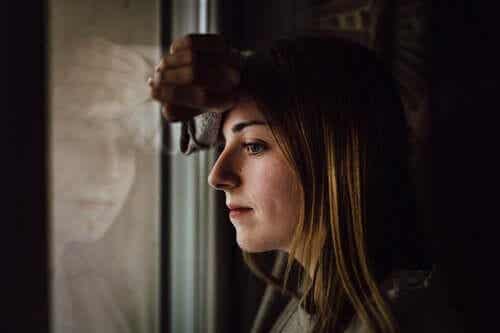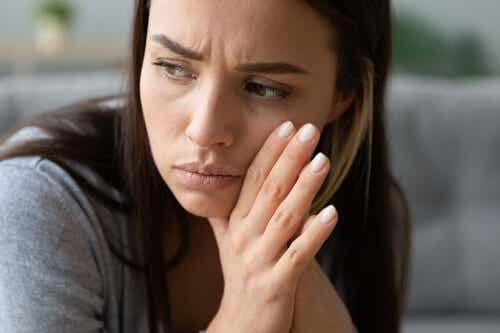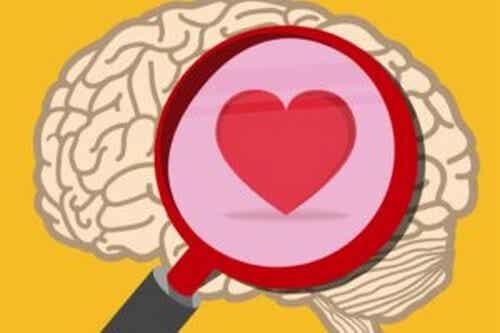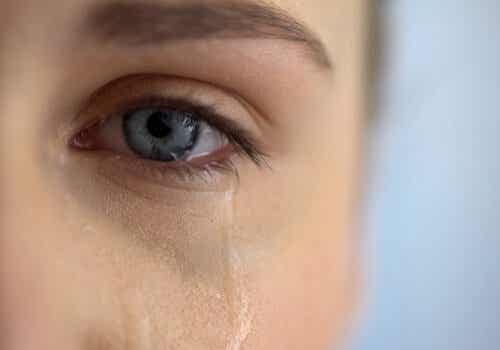If you've ever suffered from anxiety, you probably know that symptoms get worse at night. In this article we tell you why it happens and what we can do to calm it down.

Last update: 18 November 2020
Anxiety is a disorder that affects many people, and its causes and manifestations can be very diverse. There are those who experience more anxiety in the morning or during the day. However, night anxiety is more common, that is, that this state of mind worsens during the last hours of the day.
In the evening the mind tends to mull over thoughts, causing a build-up of tension. It is therefore normal that anxiety ends up becoming an obstacle to rest. This, in turn, makes the person feel more anxious during the day by triggering a vicious cycle that is difficult to get out of.
Anxiety
The term "anxiety" can refer to a symptom, personality trait or disorder. Be that as it may, it is a natural mechanism that helps us adapt, putting us on alert against a possible threat. In theory, therefore, it allows us to focus and tackle the obstacles we encounter on our path.
We talk about maladaptive anxiety when we experience this feeling disproportionately to the actual threat posed by the stimulus. That is to say, it is not the same to feel anxiety in front of a lion in the middle of the jungle - adaptive anxiety - as in everyday life because we feel overwhelmed - maladaptive anxiety.
If tried often, it causes an alteration of psychological and physiological abilities that can have serious consequences for health. The main physical symptoms include: nervousness, muscle tension, fear, increased heart rate, hyperventilation, sweating, tremors, dizziness and fatigue.
On a cognitive and behavioral level, a certain difficulty of concentration also occurs, lack of control over worries, difficulty sleeping and the need to avoid the stressful situation.
Characteristics of nocturnal anxiety
Night anxiety can have various causes. Each person experiences it differently and different conditions will lead to this situation.
Experts, in fact, are not very clear on the different reasons that trigger nighttime anxiety. However, there are some known factors that increase anxiety levels at the end of the day:
- Stress: Many people suffer from anxiety due to the stress they experience in one or more areas of their life (personal or work). When the stressors they encounter throughout the day are very intense or frequent, they keep thinking about them at the end of the day. This is how the anxiety levels increase.
- Few distractions: in relation to the above, evening and night are the times when we are least busy. This gives the mind time to think more. During the day, however, the tasks to be performed keep us away from negative thoughts.
- Associate some events with the nightAnxiety works mainly by association, that is, it occurs when we associate thoughts and symptoms with a specific moment. Suffering from anxiety for a night or two is enough to make us fear it will happen again. Unfortunately, this makes it more likely to happen or even experience anxiety for no reason.
- Physical responses: some experience physical pain or other discomfort during the night. This, along with the lack of distractions, causes additional anxiety and difficulty getting distracted and sleeping.
How to avoid night anxiety?
The most important step is to recognize that you have a problem and to maintain a change-oriented attitude. With commitment and the right tools, it can be relatively easy to overcome anxiety. However, if you don't know the guidelines to follow or need outside help, the best option is to rely on a professional psychologist to overcome the problem.
If before resorting to professional help you want to try it yourself, know that with the right motivation and perseverance, you can greatly calm night anxiety by following simple habits:
- Sports. Exercise offers numerous psychological and mental benefits. Among them, it improves mood as it helps release neurotransmitters such as serotonin, which makes us feel good. In addition to this, it reduces the presence of cortisol, the stress hormone. To calm anxiety, it is good to exercise in the morning or early afternoon.
- Pay attention to the diet. Healthy habits help us feel better and eating is one of them. In this sense, breakfast and dinner, meals that respectively start and end the day, seem to be particularly important.
- Reduce the consumption of exciting substances. The consumption of coffee, theine or nicotine alters the physiological system by increasing heart rate, sleep cycles, therefore putting our health at risk. Their consumption is highly discouraged for people suffering from night anxiety, especially before going to sleep.
- Go to sleep at the same time every night. Night anxiety is a vicious cycle made worse by the inability to sleep. It is therefore important to maintain a well-defined sleep routine.
- Sleep hygiene. Keep the room clean and cozy, use it only for sleep and rest, and perform a ritual before bed. It is essential that the time for sleep is carefully arranged. For this purpose, it is not recommended to use your mobile phone, tablet or computer close to the hours set aside for sleep. The screens on these devices alter cortisol levels causing increased stress and insomnia.
Night anxiety can be very distressing and annoying, but a series of simple steps or seeking professional help can fix the problem earlier than expected. The most important thing it is being aware of the problem and taking care of yourself.


























